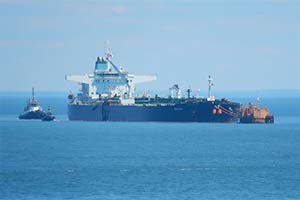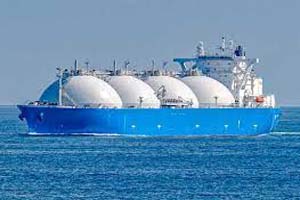
Pakistan Welcomes First Us Crude Oil Shipment
On Wednesday 29 October 2025, with the berthing of the Pakistan’s largest US crude oil tanker, MT Pegasus, at the Cnergyico oil terminal in Baluchistan, Pakistan’s energy sector achieved a momentous breakthrough. MT Pegasus departed on September 14 from Houston and on Wednesday 29 October 2025, berthed at the company’s offshore terminal, Single Point Mooring (SPM). The entire port handling and marine operations for MT Pegasus were successfully managed by Alpine Marine Services, showcasing the company’s expertise in managing large-scale tanker logistics and offshore operations. The vessel is the first-ever US crude oil cargo to dock at a Pakistani port carrying one million barrels of West Texas Intermediate crude. Cnergyico has become Pakistan’s first company to import US crude oil, with latest development a new chapter in Pakistan-US trade relations started. The import of crude oil symbols the official start of trade between Pakistan and the United States succeeding a bilateral trade agreement. The revolutionary expansion and development in the Pakistan’s energy landscape, stressing growing engagement of Pakistan in global crude markets. Cnergyico, has declared devices for a second cargo arrival in mid-November and a third shipment in 2026.
|

Pakistan, Turkiye Boost Maritime Cooperation
Pakistan and Türkiye have established to develop cooperation and collaboration in the maritime sector, predominantly in Gwadar, to drive regional progress and development, trade modification, and sustainable maritime expansion. Both countries accentuate stronger maritime connectivity, in shipping, including enhanced shipbuilding partnerships, sustainable trade, technical expertise, open new trade routes, logistics, fisheries, seafood processing and greater integration of their blue economies. Türkiye shown robust interest in proceeding maritime cooperation, unveiling plans for a bilateral ferry service to deliver a reasonable sea transport link, enhancing trade and tourism. Bringing together local and international stakeholders, strategies for a major maritime conference to strengthen cooperation and attract investments. Turkish investors to explore new investments opportunities in port operations and infrastructure to improve port efficiency and positioning Gwadar as a regional logistics and industrial hub.
|

Gas Imports Delay as Demand Declines in Pakistan
Pakistan’s national gas demand forecasted to fall by 3% between 2025 and 2040, supported by forecast, Pakistan is reconsidering gas import strategy. A new study projects a decline in demand, even with the growing population, the forthcoming liquefied natural gas (LNG) surplus expected to last beyond 2031 to Pakistan leading to potential changes in supply schedules and sustainable energy reform. Pakistan’s total gas supply is expected to peak by 2031, while demand is set to fall by 3.8% by 2031 and another 2.5% by 2040. The disparity, higher supply amid slower consumption shared with high import costs led to pressure on national finances and discouraging domestic gas exploration and production.
|

Pakistan’s Exports Underperform
According to the World Bank’s Pakistan Development Update report, Pakistan’s exports are drastically underachieving and disappointing, reflecting an approximately gap of almost $60 billion between actual exports and the export potential of Pakistan. The shortfall imitates a broadening disconnection between what Pakistan currently exporting and the export potential of Pakistan. The report underscored some vital barriers hindering export performance, including high tariffs, complex regulatory frameworks, costly energy, limited market access, low product diversification, and logistical inefficiencies, leading Pakistan’s economic growth heavily reliant on remittances and debt-fueled consumption. Export growth has been driven more by price changes than by improvements in quality or innovation, leaving the country exposed to global price fluctuations. Despite this, Pakistan holds substantial untapped export potential. To comprehend it, the report proposes measures such as adopting a market-based exchange rate, strengthening trade finance, improving logistics and regulatory compliance, and enhancing trade agreements.
|

Pakistan National Cotton Plan 2025
Pakistan’s textile industry profoundly reliant on cotton, even as international demand shifts toward man-made fibers. To address this, the Ministry of National Food Security and Research is finalizing the National Cotton Plan 2025, meant at increasing yields, refining fiber quality, and dipping expenses through modern seeds and sustainable farming. The plan targets $30 billion in textile exports by 2030, promoting export-led growth and integration into global value chains. Alongside, the government seeks to attract investment in synthetic fiber production—such as polyamide and polyethylene—to reduce imports and strengthen the textile supply chain. Complementing this effort, the Textiles and Apparel Policy (2025–30) focuses on using local raw materials, increasing value-added exports, and expanding into new markets. These initiatives collectively aim to modernize Pakistan’s textile sector and position it to capture a share of the $300 billion global technical textile market by 2030.
|

Pakistan, Sri Lanka to Unlock Blue Economy Potential
Recognizing the vast potential of the ocean economy to drive sustainable growth, job creation, and marine conservation, Pakistan and Sri Lanka have agreed to strengthen cooperation in marine and coastal tourism. The partnership aims to leverage both nations’ coastal resources to generate long-term economic and environmental benefits. Sri Lanka recently introduced a Marine Tourism Roadmap promoting eco-friendly tourism and coastal infrastructure, while Pakistan is developing its 1,000-kilometer coastline through initiatives such as harbor cruises, recreational fishing, yachting, and maritime heritage tourism. Both countries are working on a joint proposal to establish marine tourism linkages, including shared coastal tour packages, ferry services, and collaborative routes connecting major destinations—advancing regional connectivity and contributing to the growth of the blue economy.
|

National Cybersecurity Standards Obligatory for All Sectors
To reinforce national cybersecurity, Pakistan’s National Cyber Emergency Response Team (National CERT) has directed all public and private entities adopt the Pakistan Security Standards (PSS). These domestically developed standards align with global protocols such as US FIPS 140 and ISO 15408, ensuring the confidentiality, integrity, and availability of ICT systems across key sectors like defense, banking, energy, and communications. Under SRO 762(I)/2023, full compliance with PSS is required by June 1, 2028, after which non-certified cybersecurity or cryptographic products cannot be produced or sold. The defense sector faces an earlier deadline of December 2025 for new procurements. This initiative aims to nationalize cryptographic assurance, secure supply chains, and enhance Pakistan’s cyber resilience. National CERT has urged vendors and developers to start certification promptly, warning that non-compliant products will be excluded from government and defense contracts.
|

Pakistan to Benefit from GCF- Climate Resilience Program
According to the ADB the world’s largest climate fund The Green Climate Fund (GCF) of $250 million for Glaciers to Farms has been approved. The Green Climate Fund (GCF), a leading program directed by the Asian Development Bank (ADB) to build resilient water and agriculture systems for vulnerable communities in countries of Central Asia, the South Caucasus, and Pakistan which all rely on glacier and snow-fed rivers for agriculture, domestic water, and electricity generation. The funding will be provided mostly as grants and invested alongside $3.25 billion from ADB over the next decade in a series of projects identified by the countries covered by the program. The projects will improve agricultural productivity even as accelerated glacial melt increases the frequency of droughts or floods. The program will also strengthen monitoring and early warning systems to help communities manage the impacts of hazards such as glacial lake outburst floods and prolonged droughts. In addition to agricultural systems, Glaciers to Farms will also support adaptive social protection schemes and health services for vulnerable communities affected by water shortages and extreme heat stress. The program will also strengthen local banks’ capacity to support agricultural businesses, especially those led by women.
|
|
© 2025 Alpine Marine Services Private Limited
all rights reserved
|
|
|